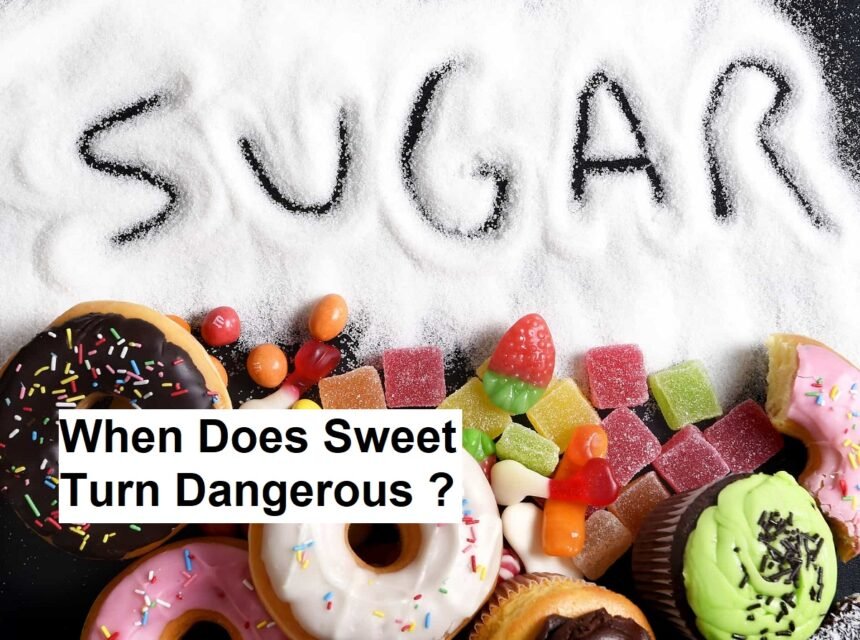Sugar is everywhere—from the obvious desserts to the sneaky hidden sugars in sauces, drinks, and snacks. A little sweetness can be harmless and even enjoyable. But the question is: When does sweet turn dangerous?
Understanding how sugar is digested and regulated by hormones will give you the tools to make healthier choices. More importantly, knowing how excessive sugar intake can increase the risk of type 2 diabetes could help you protect your long-term health.
How Sugar is Digested and Regulated by Hormones
1. The Journey Starts in Your Mouth
The moment you take a bite of something sweet, enzymes in your saliva begin breaking down complex carbohydrates into simpler sugars.
2. Absorption in the Small Intestine
Once in the small intestine, sugar is broken down into glucose (and sometimes fructose or galactose) and absorbed into the bloodstream.
3. Hormonal Regulation – The Role of Insulin
Your pancreas releases insulin, a hormone that helps transport glucose from the blood into your cells for energy.
- Low to moderate sugar intake: Insulin works efficiently, keeping blood sugar stable.
- Excessive sugar intake: Your pancreas has to produce more insulin repeatedly, which can lead to insulin resistance over time.
When Sweet Becomes a Problem
Sugar becomes dangerous when your intake exceeds your body’s ability to process it efficiently. This isn’t just about candy—it’s about all sources of added sugar in processed foods, sweetened drinks, and even some “healthy” snacks.
How Excess Sugar Increases the Risk of Type 2 Diabetes
1. Chronic High Blood Sugar
Consistently high sugar intake keeps your blood sugar elevated for longer periods.
2. Insulin Resistance
Over time, your cells stop responding well to insulin, forcing your pancreas to produce even more.
3. Beta Cell Fatigue
Your pancreas can eventually get “tired,” reducing insulin production.
4. Development of Type 2 Diabetes
When insulin can no longer keep blood sugar in check, type 2 diabetes can develop.
Signs You May Be Consuming Too Much Sugar
- Frequent cravings for sweets or snacks
- Feeling tired even after eating
- Sudden spikes and crashes in energy levels
- Increased thirst and frequent urination
- Unexplained weight gain or difficulty losing weight
Practical Tips to Keep Sugar in Check
1. Read Labels Carefully
Sugar hides under many names like “corn syrup,” “maltose,” or “evaporated cane juice.” Aim for products with minimal or no added sugars.
2. Swap Sugary Drinks for Healthier Options
Replace sodas and sweetened coffee with infused water, herbal tea, or sparkling water with lemon.
3. Balance Your Meals
Pair carbs with protein, healthy fats, and fiber to slow down sugar absorption and keep you full longer.
4. Satisfy Sweet Cravings Naturally
Choose whole fruits instead of desserts or candy. Fruits provide natural sugars along with vitamins, minerals, and fiber.
5. Practice the 80/20 Rule
Eat balanced, low-sugar meals 80% of the time and enjoy treats in moderation the other 20%.
How Much Sugar is Too Much?
The World Health Organization (WHO) recommends:
- Adults: Less than 25 grams (about 6 teaspoons) of added sugar per day.
- Children: Less than 20 grams (about 5 teaspoons) of added sugar per day.
Most people unknowingly consume two to three times this amount.
Creating a Sustainable Low-Sugar Lifestyle
Start Small
Begin by reducing sugar in your coffee or tea. Switch from sugary cereals to oatmeal topped with fruit.
Cook More at Home
Homemade meals give you control over ingredients and help reduce hidden sugars.
Plan Your Snacks
Keep nuts, yogurt, or fresh fruit handy so you’re less likely to grab candy or cookies.
Final Thoughts
So, when does sweet turn dangerous? It happens when sugar moves from being an occasional treat to a daily habit in excessive amounts.
By understanding how sugar is digested and regulated by hormones and learning how overconsumption raises your risk of type 2 diabetes, you can make smarter food choices.
Your Turn: Evaluate your eating habits, cut down on added sugar, and talk to a healthcare professional if you think you may be at risk. Your future self will thank you.












